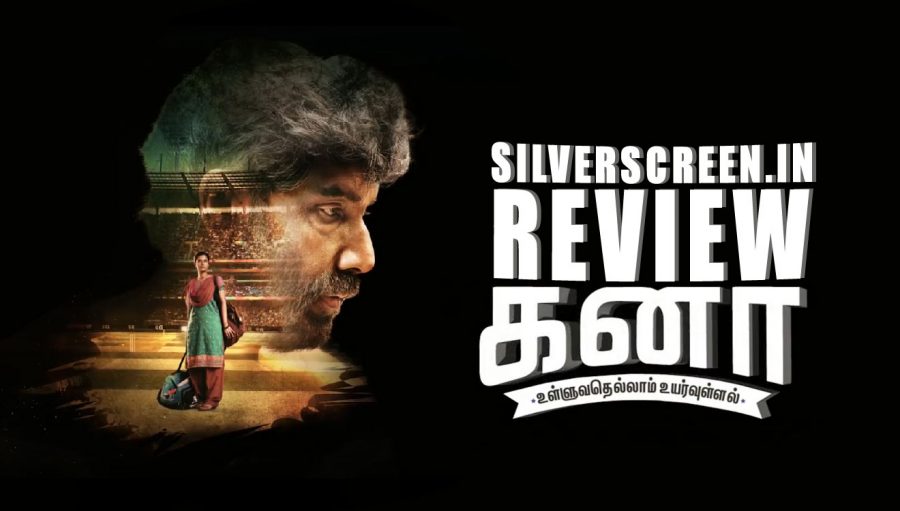Director: Arunraja Kamaraj
Cast: Aishwarya Rajesh, Sathyaraj, Sivakarthikeyan, Ilavarasu
Composer: Dhibu Ninan Thomas
For Kanaa to create the kind of revolution it envisions, there needs to be a tale that delves deep into the psyche of a young girl who dares to dream beyond what her social milieu allows. In this Arunraja Kamaraj directorial, there is insufficient reason, or reason that doesn’t quite validate Kousalya as a person, as a woman whose desires are at odds with her little world. There are sporadic glimpses of it; Kamaraj places two voices right at home, one that represents the society at large – toxic, debilitating, and the other that reluctantly tries to break away from the chains but finds itself still bound by invisible strands. They are as separate and distinct as that. Granted, the film champions Kousi’s (a brilliant Aishwarya Rajesh who truly looks the part) desire to explore something that’s socially frowned upon, but the urge isn’t rooted in her. There are no scenes that establish her love for the game, no player she revers; we don’t see her watching matches with the kind of fervour that one associates with ardent fans of the game. She instead watches her father watching matches; there are more scenes to support the latter than the former.
In a telling dialogue, Kausalya says she first watched the game in her father’s eyes – Sathyaraj who suddenly seems to have acquired a delightful paternal air overnight (or has he always been this way, one can never tell) and gets to mouth a rousing speech to boot (well done!). The urge is rooted in her father portrayed as a fan who doesn’t cry at the death of his own father, but does when India loses a match (a cow they own is casually introduced to the audience as Kapil Dev – downright hilarious, this). That’s another – the game is inexplicably tied to the country, and is rarely shorn of the need to win laurels for it.
When Aishwarya Rajesh as Kousalya is introduced, it is at a police station in the midst of what looks like an agitation. We don’t get to know the cause for it right away. It arrives in bits and pieces, in the guise of a narrator who tells the odd tale of a girl, or the tale of an odd girl – from the rural Kulithalai – with more than a passing interest in cricket. The cop listens with a mixture of curiosity and awe, and Kamaraj wants us to follow his lead. It does work. What Kamaraj presents may not be entirely unrelatable; he tries to establish an anchor at home, but the inspiration doesn’t remain just that – Kousi doesn’t break away from it to develop an identity of her own. We only know her as a young, impressionable girl idolising her father who despairs at Rahul Dravid’s despair at losing to Sri Lanka in the 2007 World Cup. Her passion for cricket – established over several lovely scenes during childhood – later turns into ones where she’s often seen caressing a bat. There’s no gradual evolution of character that defines a woman as well as a lover of the game. Kausalya identifies herself as an off-spinner, but the stray references that in the film are to popular (Indian) batsmen. But these are minor quibbles, and not so much a criticism than a call for attention to detail.
There are also no inherently female challenges that Kousi as a sportswoman faces. For instance, how does she, as a newly-menstruating young girl (it’s made a song and dance of, and is later quickly disposed off with an implied reference to a sanitary napkin), handle the challenges of rigorous physical training? Even those challenges are influenced by the male gaze (cricketer Smriti Mandhana was a consultant on the project) – and when the time arrives to finally showcase something unique to women, there are petty tiffs. For its brash display of girl power, Kanaa resorts to stereotypes and reduces women to a snivelling, bickering bunch in the dressing room, but it would be a stretch to think it mirrors reality in light of recent happenings. If anything, you know by know that Kanaa is content to stick to broader concepts than delve into nuance – but that perhaps isn’t a bad thing considering Tamil cinema has rarely ever seen a sporting film (barring Irrudhi Suttru) with women at the front.
Kamaraj wants to shout down the larger message from the rooftops first – get your girls out, and this he does effectively with Siva Karthikeyan’s help. Much of the last leg of the film is devoted to the actor who arrives with a tale of his own, and Kamaraj then ties the fate of the two together (which lends an unmistakable whiff of Chak De India). These little sacrifices that the director makes to play to the gallery eat into the time that the film could have spent on its protagonist. A subplot about the farmer’s crisis is given import as well, in part to give further credence to the setting, but Kanaa often remains torn between the two themes it tries to present. There’s also some covert rallying for and by the Tamil nation, in an unabashed attempt to appeal to mass sentiments, but it plays out as an elaborate wink and is entirely laugh-out-loud.
Recommended
One of the best parts in Kanaa belongs to Darshan as Murali Krishna who is in love with Kousi. He goes to great lengths to secure her a place in the team, is her staunch supporter back home, and at the matches. But his portions are mostly there for comic relief; not that he isn’t a worthy suitor, mind – just that Kousi has her sights on something larger, and doesn’t respond to his advances. Murali Krishna doesn’t care though – or mope. He continues to make huge banners in appreciation of her, and when something that would potentially sound the death knell for romances in most films happens to him, there’s ringing laughter. No pining, no bitter reflection on lost love, just a lot of mirth organically triggered by the wonderful writing. It’s one of the most delightful sequences in the film.
*****
The Kanaa review is a Silverscreen original article. It was not paid for or commissioned by anyone associated with the film. Silverscreen.in and its writers do not have any commercial relationship with movies that are reviewed on the site.



